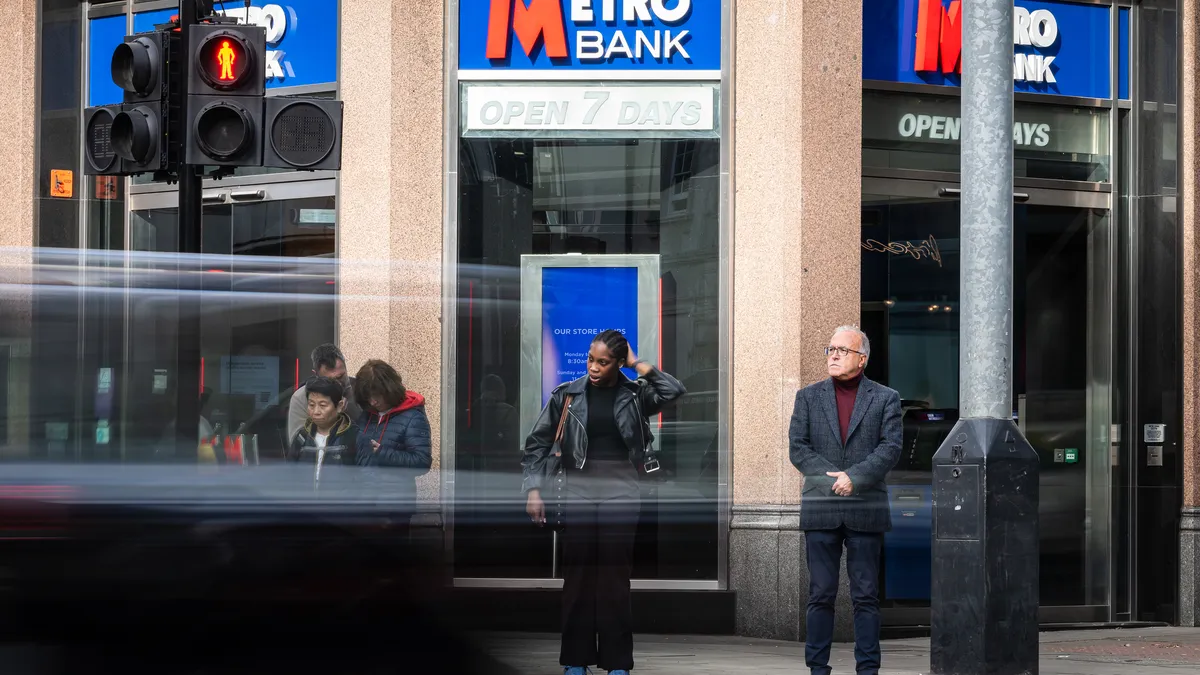Metro Bank is planning £30 million more in cost savings by the end of 2024, it said Wednesday in its full-year results, raising the specter of further job cuts at the U.K. lender.
Not all new cost savings would come from staff cuts, Metro CEO Daniel Frumkin said, according to the BBC. But, he added, “inevitably some will have to come from colleague costs.”
The bank has already eliminated roughly 1,000 employees — about 22% of its workforce — since announcing an initial £30 million cost-cutting plan in October. That figure later expanded to £50 million. The 1,000 positions cut represent 200 more than the bank initially targeted in November.
Among non-payroll cuts, the bank plans to end its seven-day-a-week branch model — an idea Metro said it was considering last fall. The bank will close all 76 of its locations on Sundays beginning March 29, according to the BBC. Beyond that, 44 of Metro’s branches will be closed on Saturdays, too — leaving 32 on a six-day-a-week model. Additionally, all of Metro’s locations will trim an hour off of each end of their weekday business — meaning branches will be open 9:30 a.m. to 5 p.m. Monday through Friday. Locations will also close an hour earlier — at 4 p.m. — on Saturdays.
“Based off of the modeling we’ve done, we’ll still be open more hours than any of our competitors on the high street. And we’ve aligned it with actual customer activity,” Frumkin said, according to The Guardian.
Metro’s reduced branch hours don’t dampen the bank’s plans to open 11 locations across northern England that it considers “hotspots” for small and medium-sized enterprises, Frumkin said.
Although branch staff has taken a sizable hit among Metro’s job cuts, Frumkin noted the bank has trimmed its board and executive team, too.
“This was a top-down exercise and nobody was exempt from needing to find savings,” he said, according to The Guardian.
The bank’s risk, finance and human resources teams have also seen cuts, Frumkin said.
Metro saw a pre-tax profit of £30.5 million for 2023 — its first since 2018. That contrasts against a £70.7 million loss in 2022.
Metro also reported an underlying annual loss of £16.9 million. That’s down from £50.6 million a year earlier.
The bank tempered its expectation for return on tangible equity. It now forecasts a low-single-digit ROTE in 2025 that could climb to the low-to-mid-teens by 2027.
No decision has been made regarding a push to persuade regulators to let Metro use an internal model to calculate risk-weighted assets that may boost the firm’s capital ratios, Bloomberg reported.
Deposits stood at £15.6 billion, but the bank did not detail how much money customers withdrew last fall, ahead of a £925 million capital raise and debt refinancing rescue deal that gave Colombian banker Jaime Gilinski Bacal a 53% controlling stake in Metro.
The outflows spurred the bank to offer instant-access savings rates as high as 5.22%, and a one-year fixed-term savings account with a rate of 5.91%.
The success of those products, though, generated unexpected costs, and Metro now wants to reduce its deposit base this year, The Guardian reported.
“2023 was certainly an eventful year for Metro Bank,” Frumkin said, according to Reuters. “But I'm confident we are now a stronger business with stronger foundations.”
One area where Metro has already improved for 2024 is business lending. The bank approved 140% more business loans in the first 10 weeks of this year than it had in all of 2023, The Guardian reported.
“We believe there is a long road ahead and execution will be key, but the refinancing package has bought management time to reshape the bank,” Benjamin Toms, an analyst at RBC Capital Markets, said in a note.











